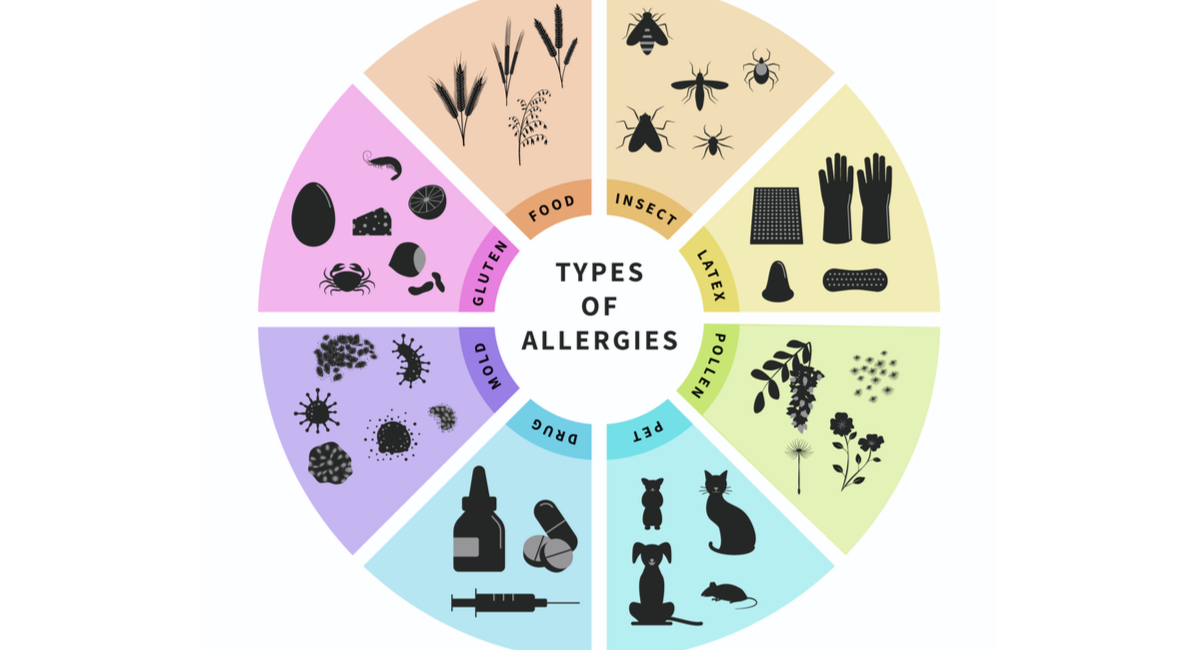Allergies vary in severity, with some causing minor inconveniences while others pose serious risks. Conditions like allergic rhinitis and hay fever typically lead to mild symptoms such as a runny nose and watery eyes. However, allergies triggered by anaphylactic reactions to certain foods or medications can be life-threatening. It’s important to note that not all positive test results indicate a genuine allergy, which is why Ayurveda conducts a comprehensive analysis to understand the true nature of allergies.
Exploring Dosha-Related Allergies: Symptoms and Dietary Considerations
Vata-Type Allergies
Allergies of the Vata type primarily affect the digestive system, manifesting as symptoms like abdominal bloating, discomfort, cramps, gurgling intestines, tingling mouth, and facial swelling. Additionally, Vata-related allergies can lead to other discomforts like headaches, wheezing, sneezing, dry cough, dry eyes, joint pain, muscle spasms, and insomnia.
Imbalances in Vata are often linked to heightened sensitivity to specific foods, including raw items, certain beans, pork, and red meat.
Balancing Vata
To address Vata imbalances, Ayurveda recommends staying hydrated with warm herbal liquids like ginger tea with honey or licorice tea. Calming herbs like Ashwagandha help maintain optimal Vata levels while soothing the immune system to reduce allergenic reactions. Embracing a Vata-pacifying diet, which includes warm, oily foods prepared with organic oils or ghee, is essential. Avoid dry foods and leftovers, opting for cooked vegetables and steering clear of items like broccoli, cabbage, cauliflower, dark leafy greens, and most beans, even in cooked form. Opt for smooth-textured foods like rice pudding, bananas, hot cereals, root vegetables, and pureed soups.
Pitta-Type Allergies
Pitta-type allergies typically manifest on the skin when allergens come into contact with the skin and enter the bloodstream. Symptoms include skin inflammation, burning and reddish eyes, sinus and airway inflammation, hives, rashes, eczema, heartburn, stomach upsets, indigestion, and vomiting.
Imbalances in Pitta often lead to food sensitivities and allergies to hot and spicy foods, citrus fruits, fermented foods, as well as vegetables like potatoes and tomatoes.
Balancing Pitta
To pacify aggravated Pitta, Ayurveda recommends cooling herbs like coriander and cilantro. Herbs such as Guduchi, Amalaki, and neem can soothe the respiratory system and skin. Consuming cool juices made from natural ingredients and clarified butter or ghee can help alleviate inflammatory reactions. Choose cool or cold foods over hot ones and incorporate cooling spices while avoiding most heating spices. Limit the consumption of eggs, hard cheese, nuts, olives, and sour cream. Opt for milder foods like apples, cucumbers, lime juices, and soft cheese over sharper alternatives like pineapples, pickles, and vinegar.
Kapha-Type Allergies
Kapha-related allergies often emerge during the spring season due to pollen-based allergens. Symptoms may include nasal congestion, runny nose, watery eyes, sneezing, irritation of mucus membranes, hay fever, sinus infections, asthma, bronchial congestion, water retention, and sleep disturbances. These allergies can also lead to digestive issues and a sense of heaviness in the stomach.
Imbalances in Kapha can make individuals sensitive to dairy products, wheat, and watery fruits and vegetables such as watermelon and cucumber.
Balancing Kapha
To balance Kapha, it’s essential to stay warm and dry and avoid mid-day naps. Sip on light and clarifying teas with ingredients like ginger, cardamom, and cinnamon, adding small amounts of local honey to reduce Kapha and pollen sensitivity. Embrace freshly cooked foods and include whole foods that are light, dry, warming, and well-spiced. These choices help regulate mucus production, maintain moisture levels, support smooth digestion, and facilitate toxin elimination. Avoid or reduce consumption of junk food, sweets, and opt for fresh fruits and vegetables. Incorporate a variety of legumes and favor foods that are light and not heavy or oily. Choose green or black tea over caffeine, and steer clear of heavy Kapha-inducing items like wheat, puddings, cheese, pies, cakes, flour, bread, red meat, pasta, and processed or deep-fried foods. Avoid cold or frozen foods, carbonated beverages, and leftovers. Prioritize foods with roughage that are easy to digest, including cabbage, broccoli, cauliflower, and dark leafy vegetables, which should be cooked moderately before consumption.

